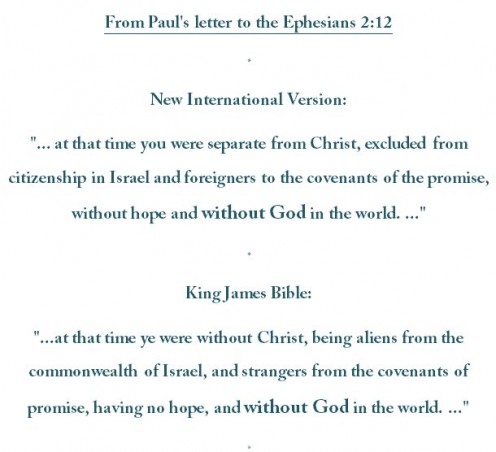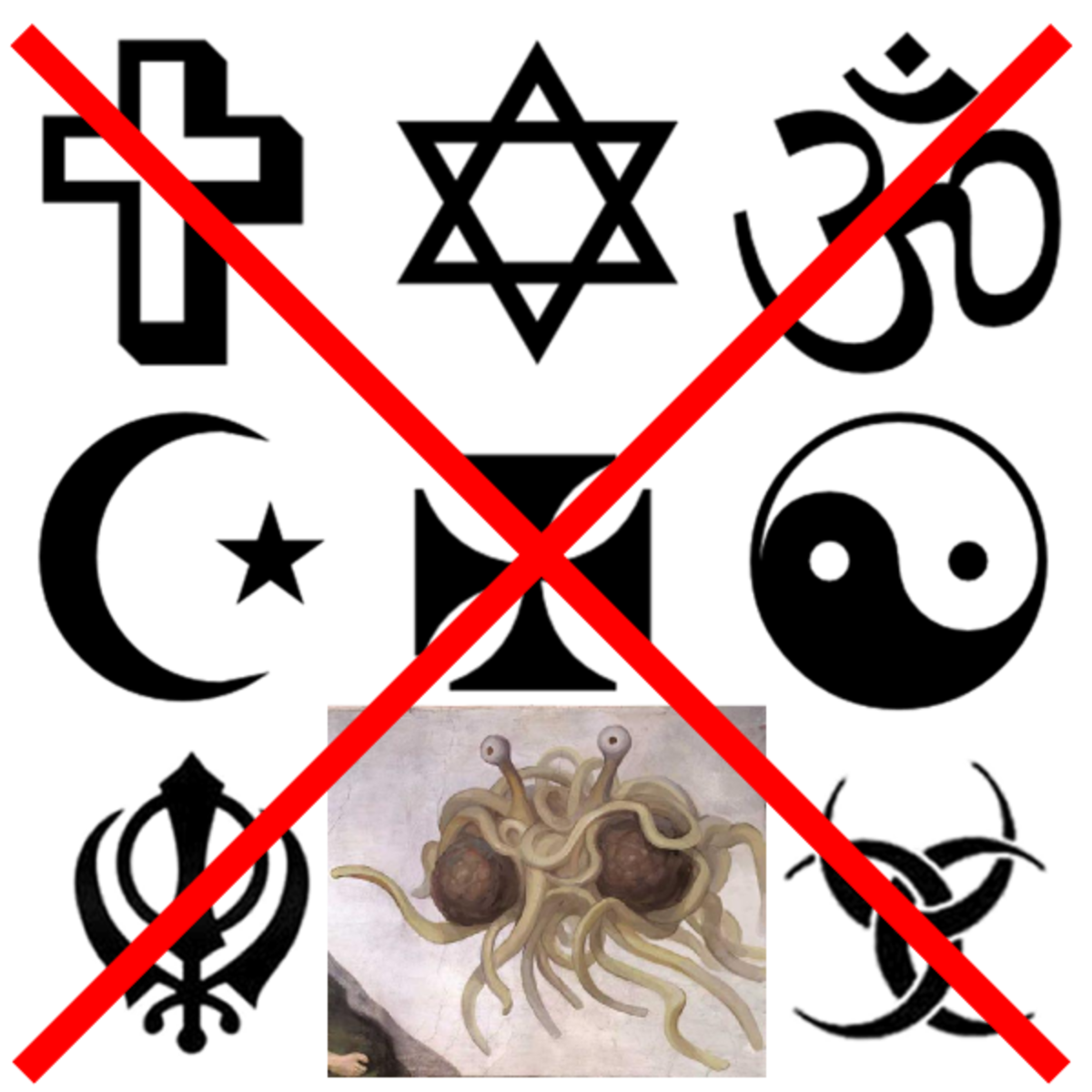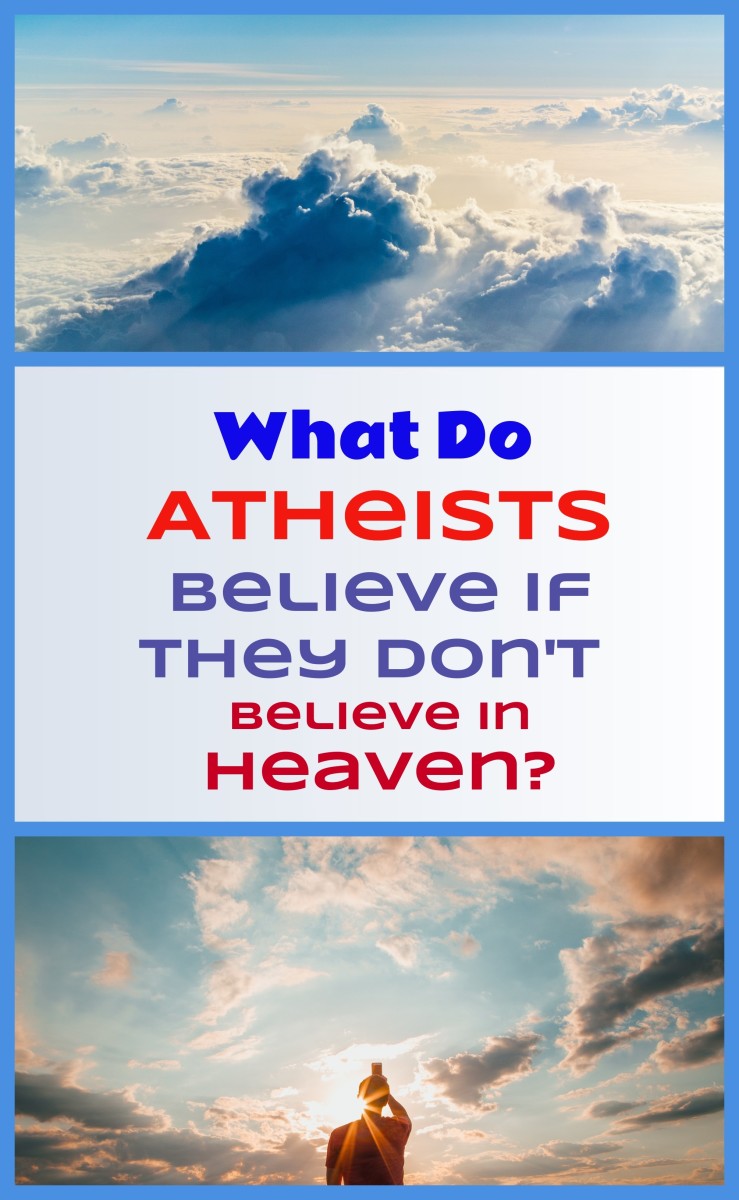'Top Ten Atheist Inconsistencies' Examined
Atheist Issues?
'Top 10 Atheist Inconsistencies' was an article posted on HubPages by fellow 'Hub Pages' member, 'Graynight', to which this item is a response.
That original article is no longer available, but we may still consider the issues.
*
What is the difference between atheists and antitheists?
Are atheists really guilty of at least 'ten inconsistencies'?
Or would that be the antitheists?
Or both, perhaps?
How about agnostics?
~~ ~~ ~~ ~~ ~~ ~~
Atheist: Greek "atheoi" αθεοι - "Those without God" [Ephesians]

"Atheoi" / Atheists
The Greek term "atheoi" (αθεοι) is found in Paul's Epistle to the Ephesians 2:12. Indeed this is the only place in the New Testament where the word can be found.
"Atheoi" refers to people who are 'without God'.
Above is an image of the word from a late 2nd / early 3rd century papyrus.
More details here: http://commons.wikimedia.org/wiki/File:Ephesians_2,12_-_Greek_atheos.jpg http://en.wikipedia.org/wiki/File:Ephesians_2,12_-_Greek_atheos.jpg
'Ten Inconsistencies'?
When Graynight, wrote a hub about, what he termed, the 'Top 10 Atheist Inconsistencies', he looked at atheism in ten contexts:
It is worth examining these 'inconsistencies', one by one:
War and Murder
Love
Fidelity and Procreation
Altruism
Abstract Immortality
Literal Immortality
Feelings
Meaning
Mutability
Suffering
From Paul's letter to the Ephesians 2:12

The Bible

Atheist? Antitheist? Agnostic? Some Introductory Thoughts
I consider myself agnostic, rather than atheist,and this may need further explanation. The word 'agnostic' is related to the word 'knowledge'. I do not believe that either I, or anyone else, has enough, suitable, knowledge to know whether or not there is a God.
I am aware of the fact that many people have experienced events, which appear to have been 'supernatural'. I know that there is still much that is unexplained, and might possibly be considered 'paranormal', so I keep an open mind on such matters.
However, while I believe that it is not possible to know either that God exists, or that God does not exist, or what any God might be like, I think it likely that any God would probably either be an immense abstract power, incomprehensible to humans, or, perhaps, the mass 'essences', or souls', of deceased beings.
As far as the existence of 'God', is concerned, I think that sacred scriptures are mankind's attempts at understanding the inexplicable, and are, therefore, human invention; describing human ideas about what might be termed 'God', rather than being based on anything factual.
'The Holy Bible'

'Atheism' often seems to relate to 'God', as originally described in the Old Testament. It also often includes a belief in a divine Jesus. Of course, there are other current belief systems with different views. But few people, nowadays, would call someone who did not believe in Zeus or Odin, an 'Atheist'.
This is something to ponder, because when 'believers' write about the apparent inconsistencies of atheism, they are usually talking about people who do not believe in a specific form of 'God', ie. as 'God' was originally described in the Hebrew Scriptures.
Consequently, criticism of atheists is often applied, almost equally, to agnostics.
Furthermore, agnostics and atheists do share some ideas and opinions.
I do understand why so many atheists feel as they do ~ and I often agree with them.
Thus I feel qualified to respond.
I am simply going to reply to to the assertions made ~ I am not going to refer to a writer or philosopher, whom I know little about, but who Graynight may have cited.

No 'Rules' in Atheism
Graynight claims that atheists 'criticize theists [for their] contradictory beliefs .., but they ignore the contradictions and inconsistencies that are so prevalent within the scope of their own attitudes and ideologies.'
Is that true?
Are atheists inconsistent and contradictory?
Is there an 'atheist attitude' or 'an atheist ideology'?
Before looking at the ten observations of Graynight, it is worth noting that Atheism is not a religious movement, nor anything of that nature, as so many believers seem to think that it is.
Therefore, one atheist does not have to agree with another.
There is no accepted 'dogma'. There are no 'rules' in atheism.
Different philosophers may have different ideas and theories, but other atheists do not have to approve of their conclusions.
The supposed 'contradictions and inconsistencies' are, therefore, completely irrelevant. Atheists simply do not believe that God exists.

'Atheists or Antitheists'?
Graynight begins his hub:
'Atheists - or antitheists, which may be a more fitting term in this context .....'
This comment makes matters more complicated.
Are we looking at the attitudes of ordinary atheists, or at the behaviour of people who don't like theists?
Atheists do not believe in the existence of God
Anti means 'opposed to'.
Theists believe in the existence of a Creator God (or gods).
Thus Atheists are not the same as Anti-theists.
Atheists disagree with theists; anti-theists are opposed to theists.
Some atheists may also be anti-theist ~ but the hub title concerns supposed 'Atheist Inconsistencies' ~ so this confusion between the two terms could lead to some ... confusion.

War and Murder
Graynight: 'One of the biggest lies told by atheists is that the majority of martial conflicts in the world have occurred as a result of people believing in God'.
*
I agree that wars are rarely going to be about one issue, and that power and resources are often key, but ...
But, religion is very, very often also key!
The divide between warring factions is often along religious lines.
Religion is, very often, a very important factor.
And, as Graynight admits, some wars are actually called 'Holy Wars' or 'Wars of Religion'.
Just because other factors may be involved, does not mean that religion is not relevant.
And there are examples in the Bible ~ so any potential Christian 'Crusaders' should know exactly what to do! Consider the death and destruction in the story of the Amalekite bloodbath, where even tiny babies were killed.
Since Graynight indicates that Christianity should not be blamed for the bad behaviour of Christian leaders ~ eg. of the Crusades etc ~ then it is only logical to say that atheism should not be blamed for the bad behaviour of any atheist rulers. Thus Stalin, Pol Pot, Hitler, etc, should not be held up as examples of atheism.
As an aside, it is often claimed that Hitler was an atheist, but there is also evidence that he was Roman Catholic, so that is a debatable matter. Furthermore, the fact that atheists may have murdered people does not absolve Christians of their own guilt.
Look at the troubles that have occurred in the Balkans, the Middle East, Northern Ireland ~ are they all the result of religious difference? ~ No! Is religion involved? ~ Very much so!

Love
Graynight: 'if you place any kind of ideological value in love and think that there is anything to it other than the synapses in the brain firing in a particular pattern, you are a religious person'.
*
I don't see the logic of this statement. Why does one have to be a religious person to think that love has 'ideological value'? There is more than one ideology.
Whatever the science behind love, people still feel it ~ and it makes people feel great.
It makes people want to help and care for their fellow man.
It has a positive influence on people. It affects people's moral behaviour.
Thus 'love' must be valuable to society.
I have read the scientific books on love and I still believe this.
Religious people do not have a monopoly on love.

Fidelity
Graynight: 'many atheists pride themselves on being able to live according to strict moral codes without needing a deity'
*
The fact is that many atheists can, and do, live according to strict moral codes ~ and they don't believe in a deity.
There is no argument against this, because it is a simple truth. Somehow, most of us have developed a conscience.
OK, believers may say that the conscience is God-given ~ but they cannot prove that. Indeed, evolutionists believe that morality has evolved with society, based upon what is best for that society.
Regardless, Christianity does not have a monopoly on morality.
Why do Christians keep assuming that it does?
It does not!

Procreation
Graynight: 'atheists who think themselves to have such lofty levels of cognition seem to believe that the human genome does not need their superior genes.'
*
One thing that the thinking, caring, educated person notices is that our world is becoming over-populated, polluted and generally damaged by mankind.
Responsible parenthood is a positive thing. In countries where childen often die, and where there is little or no contraception, it is not surprising that many babies are born, but, where contraception, health care and education are available, it makes sense to limit one's family to a reasonable number.
Research has shown, I think, that many atheists tend to be educated people, so it is not surprising, if they have given this matter serious thought and decided to have fewer than the average number of children ~ rather than 'filling the world with [their] seed'. [Graynight quote.]
It is not a good idea, to carry on harming our world, in the hope that 'God will provide'.
Do atheists 'detest' the 'theist masses' and plan their families accordingly!? Or do they simply disagree with them, resent the hostility of some of them, and then get on with their own personal lives?

Altruism
Graynight: 'many atheists still cling to .. concepts of virtue - [like humility, charity, and altruism] .... because they cannot bring themselves to let go of these last vestiges of theist irrationality' ... 'in a universe with no God and no life after death, there is only one thing that matters: me'. ~ 'why do most atheists today still advocate at least some level of altruism?'
*
I am bewildered by this.
In a roundabout way this is suggesting, again, that, without God, there is no morality; no goodness; no charity; no altruism.
Let me repeat: Christianity does not have a monopoly on morality!
Calling a 'virtue', a 'Christian virtue', does not it a 'Christian virtue' make, I'm afraid.
And virtues are not irrational; they are beneficial to society.
Ayn Rand and Friedrich Nietzsche can have any opinions that they wish. Atheists do not have to read them, or agree with all of them.
It is simply not true that, without a belief in God, there can be no virtue, no altruism, no morality, and only selfishness.
A religion is a 'faith' or system of worship, related to a belief in a God ~ a powerful superbeing. It is not really possible to be truly 'religious', if one does not believe in a God or belong to a related faith. Of course, one can treat a sport almost like a religion, but that is not the same thing.
The fact that atheists can be moral people (which Graynight acknowledges) without belonging to a religion, or even believing in God, shows that Graynight is incorrect in saying that moral codes 'are almost completely irreconcilable with a non-religious worldview', since, self-evidently, this cannot be the case.

Abstract Immortality
Graynight: 'noble atheists deal with the problem of death by focusing on the fact that, though they will die, their memories and the effects of their lives will live on.' ... 'Noble atheists must realize that their memories and their legacies are as doomed as they are'.
*
It seems to me that, while someone is remembered, there is, indeed, an aspect of them that lives on.
I study my family history, and ancestors, whom I didn't even know existed, have come alive for me. Without them, I wouldn't even be here. Now I can 'bring them back to life' for the rest of my family to get to know them. That's wonderful.
If their souls live on, in an afterlife, then I hope that this makes them happy. If their souls die at death, then at least they have lived again, for me, and they are not entirely forgotten.
Of course, they will eventually be forgotten, as will I.
Eventually, it seems that this whole world will die and nothing of us, or our history, or achievements ~ or our religious beliefs ~ will be left. I am quite sure that most educated atheists are fully aware of this.

Literal Immortality
Graynight: 'Some atheists .. advocate transhumanist doctrines that prophesy of a near future ... in which ... humans will be able to use science to achieve immortality. ..... But does he believe it's possible that there just might be another being in this vast universe who has achieved all knowledge before he has? No, that is ludicrous.'
*
Science has provided many advances. Could it give us a future, where humans can become immortal? Possibly, I would say. But, then, where would we put all of the people?!
I don't see any problem with accepting this as a hypothesis.
Is it ludicrous to suggest that God has already done this? ~ Well, though I can see the point of this argument, it probably is ludicrous, because even Christians don't portray God as a scientist, experimenting and learning as he goes.
Indeed, God is portrayed, more, as a magician. He can make himself immortal, because he can; because he is God ~ not because he has studied science and discovered ways to outwit death.

Feelings
Graynight: 'Many atheists proudly say that they do not need dogma to tell them what is or is not right..... "just feels right... But when theists say that they believe in God because it "just feels right," that is proof of a lack of intelligence.'
*
Back to morality, again.
Christianity does not have a monopoly on morality.
Christianity does not have a monopoly on morality.
Christianity does not have a monopoly on morality.
Atheists are at least as moral as anyone else. Check court and prison records and I am guessing that you will find this to be correct.
Why don't they go on criminal rampages?
Because they know right from wrong.
Most are intelligent enough to see the damage that crimes do to their societies. They do not need the Bible to tell them that.
OK, some may just say that it 'feels right', but if it does just 'feel right', then this is because it is something that they have learned from reading, studying, discussing, observing, etc, etc.
The fact that atheists are as moral as Christians is evidence that Christianity does not have a monopoly on morality.
Some feelings are based on actualities; some are just based on ... feelings.
I have to wonder, do atheists actually use the argument that morality simply 'feels right'?
Some probably do, but I haven't heard this 'feels right' argument.
I have heard that morality benefits society and that we have a conscience, etc. but nothing about feelings. This does not negate feelings, of course, but they do need to be backed up ~ if only by saying "I don't understand them, but I live by them".

Meaning
Graynight: "No, I don't believe in God or final judgment, but I have still found meaning in life" ... ask him what great meaning he or she has found, and the response is sure to disappoint you profoundly".
*
Dear, dear, dear!!!
I am tempted to ask how people dare to accuse others of having no meaning in their lives!!!
What if the atheist said: 'I have heard it many times: "Yes, I believe in God and final judgment, and I have found meaning in life." However, when your friend says this, ask him what great meaning he or she has found, and the response is sure to disappoint you profoundly.'
The atheist really could say that.
Since s/he has rejected belief in God, then the meaning that Believers have supposedly found, can't do much for atheists, so they would, indeed, be disappointed.
Atheists can enjoy love and life, children and families, sunsets and rainbows, discovering the past and planning the future. There is so much in this world that we can all enjoy.
Did God make it? Believers think that he did; Atheists think that he didn't. And no-one can prove either of them right or wrong. So the atheist can find as much meaning in his world and his life as can the Believer.
Christianity does not have a monopoly on finding meaning in life, either!

Mutability
Graynight: 'if human life ends with death, and if there is no God, then our existence is nothing more than wind blowing through trees... Mortal humanity as atheists view it cannot be its own end and meaning.'
*
Maybe our lives are 'nothing more than wind blowing through trees'. Maybe our sole 'meaning' is to reproduce and keep our world inhabited ~ just like all of the other animals

Suffering
Graynight: "I suffer. Therefore, there is no God." It's the common mantra of the bitter atheist'. 'The idea that an omnipotent and benevolent God would never let us suffer at all is ludicrous'
*
I have heard it said that the suffering in the world is evidence against the existence of God, and I think that this is reasonable conclusion to draw. Christians say that God is the father and creator, who loves us all ~ even the tiniest sparrow. Well, if that is the case, why, indeed, does he allow us to suffer so much?
I have heard the arguments about parents allowing children to hurt themselves, in order that they might learn about dangers, etc. but I am not talking about anything like this.
Why do innocent children suffer serious diseases? Why do innocent children suffer at the hands of torturing psychopaths?
Why can lions and tigers only live by killing and hurting others of 'God's creatures'?
Why is it 'ludicrous' to ask this?
Furthermore, why does God, as described in the Bible, set such a bad example re causing people to suffer?
The Amalekites were to be annihilated ~ God ordered it. Even the tiny new born babies had to be sliced apart by the edge of a sword!
Job ~ the very good, loyal and devout Job ~ had to lose everything. God sanctioned it ~ in a bet with Satan.
Sam Harris is correct to say that little girls are raped and tortured on a regular basis ~ including the ones, whose parents are praying for them and who believe that God / Jesus is taking care of them ~ in the vain hope that she will be safe. This isn't a childish comment; nor is it a particularly atheistic comment. It's just a fact.
Would suffering end, if atheism ruled the world? ~ I doubt it.
Would suffering end, if Christianity ruled the world? ~ I doubt it.
People are people ~ and some people do some extremely bad things.
If believers are right, and God is there, then why does he not protect the innocent from these very bad people?
To say that mutilated infants and children, who have died after experiencing untold horrors, will be 'healed in Heaven' is simply not good enough. They have suffered unbelievable horrific cruelty ~ and their families continue to suffer.

Mutual Lack of Understanding
It strikes me, sometimes, that some Christians simply cannot understand the minds of those, who don't think and believe as they do.
And perhaps the feeling is mutual.
But I cannot see these 'atheist inconsistencies'!

Original Hub: 'Top 10 Atheist Inconsistencies' - By Grayknight
To read the original article ~ and to check whether I have been fair in my responses, please look at the hub:
'Top 10 Atheist Inconsistencies' ~ By Grayknight
Link below
Another Rebuttal:
Titen-Sxull has also responded to Graynight's hub.
Link below
Links to Related Items:
- The Top 10 Atheist Inconsistencies?
By Titen-Sxull

Some of My 'Religion' Hubs:
- If Jesus Were Proven to be Son of God / God Incarnate, Would Atheists Become Christians?
- God, Ghosts and Guesswork
- 'God is Love' by Percy Dearmer ~ Analysis of a Popular Hymn
- Genghis (Chingis) Khan ~ and The Bible
- The Destruction of the Babies and Children of Amalek ~ The Slaughter of the Amalekites
- The-Execution-of-the-Wood-Gatherer-in-Numbers-15-Old-Testame
- QUOTE: "How could the Earth, and all Creation, be so Beautiful, without a Creator?"
- Evolution - My Take On It and How I Arrived Here









